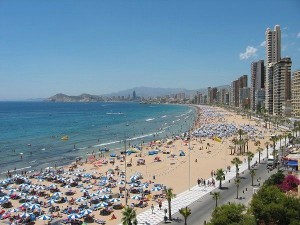
“Environmental sustainability cannot be understood today without taking into account the economic factor. Only when environmental policy is economically viable can it be sustainable over time. Economic viability and environmental sustainability will be, therefore, the two aims of the policy that this ministry will pursue.”
This sentiment, voiced by Environment and Agriculture Minister Miguel Arias Cañete recently, sounds sensible enough. But the full content of his speech, addressed to a congressional committee and outlining his intentions for this legislature, has stirred some deep fears among environmentalists. It has also brought the sustainability-versus-growth debate into the spotlight in Spain.
Arias Cañete believes environmental regulations and laws in 26 areas are needlessly restricting the development of the Spanish economy. With unemployment at nearly 23 percent, a deficit of over 8 percent and GDP forecast to fall back into recession this year, getting the economy back on track is, understandably, the government’s main priority.
But at what cost? Arias Cañete has yet to provide details of how exactly his ministry will tackle these troublesome restrictions, but he did identify a number of areas he believes require particular attention. Regulations protecting biodiversity, water management and air quality were among them. So too, to the alarm of environmentalists, was the Coastal Protection Law.
“What we’re going to have with this deregulation of environmental laws is an easing up of procedures and regulations that will allow new infrastructures,” said Samuel Martín-Sosa of Ecologistas en Acción in Madrid.
Activists such as Martín-Sosa suspect that the government of Mariano Rajoy is essentially using the flagging economy as a pretext to steamroller green concerns that never really interested it in the first place.
“What is at stake here is the fulfilment of objectives and commitments – international commitments – that Spain has taken regarding air quality, regarding CO2 emissions, regarding biodiversity – all this is at stake now with the new plans,” he told Iberosphere.
But until the government rolls out the detail we won’t know if that is indeed the case. And there are those who are delighted at Arias Cañete’s approach, such as the business sector.
According to Rodolfo Gijón of the CEOE Employers and Industries Federation, previous governments (and without saying as much, he seems to mean above all that of Zapatero) have “prioritised the protection of the environment without ensuring the competitiveness of Spanish companies.”
Green groups would argue that no such priority has been given to the environment, by the last, or any other government. Nitrogen dioxide and particle levels are a particular problem in Spanish cities and a clean air plan was only introduced at the very tail-end of the Zapatero administration.
But the CEOE says that some regulations are obviously holding the Spanish economy back without any real environmental benefit, such as certain bureaucratic measures related to the Environmental Responsibility Law. Officially approved and costly environmental check-ups, for example, can be an unnecessary burden for small companies, many of which have been left on their knees by the current crisis.
These sorts of tweaks and adjustments to avoid the counter-productiveness of one-size-fits-all regulations could make sense.
But talk of a major overhaul of water regulations or the Costal Protection Law hint at something altogether different. Such changes would reinforce the idea that the Partido Popular government is, in its desperation to foster economic growth, pumping up another housing/construction bubble, and in the process stretching depleted water supplies and exploiting coastline that has already been butchered in many areas.
Martín-Sosa warns that Spain will “go back 10 years” if the government behaves as he expects it to. Such a policy, he says, would not only be disastrous for the environment, it would take Spain’s economy into exactly the same kind of bubble that led it into its current mess.
With this debate starting to play out in the wake of his recent announcement, the environment and agriculture minister is shouldering a huge responsibility: the challenge of finding a way for the country’s economy to recover and grow, without history repeating itself.
Leave a Reply
You must be logged in to post a comment.